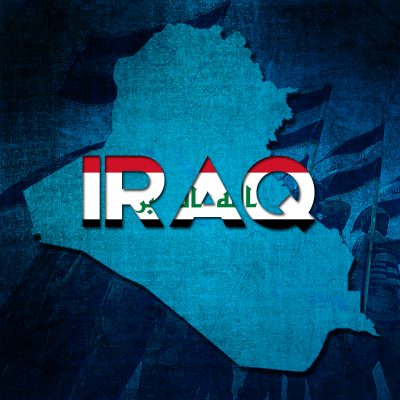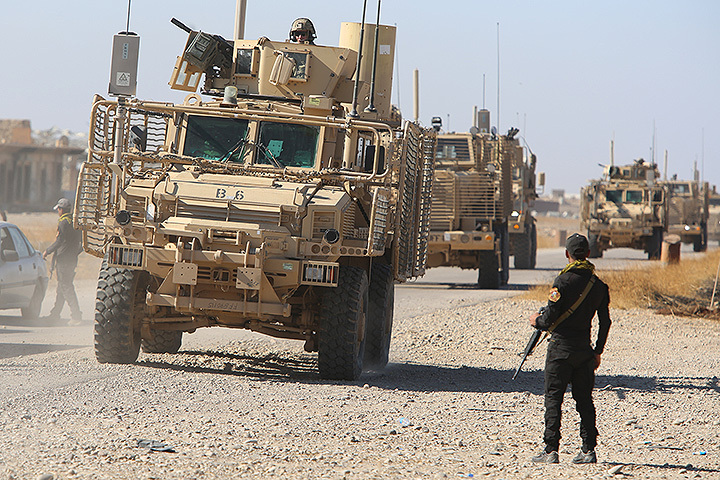The four main differences between the military operations currently underway in Syria and Iraq.

2. Media
Early in the morning we were, per schedule, at a checkpoint just outside Kurdistan. The previous day, Iraqi army press officer promised to take journalists to the front lines. And the number of those who desired to see the actual assault on Mosul grew with every minute, as if the reporters were multiplying through cell division.
In the end, about 50 journalist jeeps and 10 Humvees with Iraqi spec ops moved out toward Mosul. We instantly realized this is not how one goes to war. And after 10km, still 15km short of Mosul, it became clear this was simply a PR trip. Upon stopping in a tiny liberated village, we encountered generals lined up to offer comments. To make the picture complete, an endless column of refugees that broke out of Mosul was made to wait. Having listened to the military commanders, journalists posed in front of Humvees and asked the refugees about the horrors of life under ISIS.

There are no news coming from Mosul itself. The only “news agency” within the city belongs to ISIS and all internet providers are being blocked. Internet in general is prohibited to the general population, and nobody within ISIS is providing the chronology of combat operations online. Unlike in Aleppo, where everyone who’s not lazy is taking photos and videos. And every troubling photo is being passed off as the consequences of Russian airstrikes. We asked the refugees from Mosul how accurate is the coalition aviation. They looked at the dozens of TV cameras with fright, and gave a very diplomatic answer: “ISIS is amidst us. It’s impossible to hit terrorists without also hitting civilians.” All in all, journalists from all over the world have the ability to cover the operation in Aleppo. But Western audiences are usually shown reports coming from the “moderate opposition” camp. Even though those who oppose Assad in Aleppo are scarcely different from the surrounded islamists in Mosul.

3. Political
Russia is operating in Syria on the invitation of the legitimate government, cleaning up after those who spent five years toying with terrorism, equipping and sponsoring various islamist formations. In Iraq, the US is attempting to clean up after itself, in order to hold on to the reins of regional influence which are rapidly slipping through its fingers. And it does whatever it wants within its own “protectorate.”
To a degree, the situation resembles the Spring 1945 “army races.” Occupying this or that geographic location would yield unimaginable political dividends to one of the “sworn friends.” Even the participants of this race are the same: USSR’s successor state, Russia, and the US.
Taking Aleppo will change the polarity of the entire Middle Eastern political environment. Russia will advance from “having presence in the region” to being the deciding power and, should the Mosul assault fail, the dominant one. It is to Russia that everyone who has been offended by the international committee, which has done enough to warrant three Final Judgments in the last several years, will turn with complaints and proposals. The Assad Regime will be legitimized once and for all, and the pro-Western Free Syrian Army will have its lack of support and general weakness reconfirmed for all to see. It will mean the end the West’s financing and lobbying on its behalf. The West does not like money-losing projects. As a reward, in addition to two military bases on the Mediterranean, Russia will also don the blindingly white toga of a peacemaker to which no dirt will adhere, and then it will be able to seriously take care of a certain fascist state which appeared in the vicinity of Belgorod. Incidentally, not without the help of our “partners” in the fight against ISIS.
The capture of Mosul will also yield sizable dividends to the coalition members. First and foremost, to Mrs. Clinton. And to the entire Western Middle Eastern policy of the last several decades and most recent two years. The construct named Iraq that has been lovingly assembled by the West has shown itself to be utterly unviable as a state after the loss of Mosul. The Iraqi army has been pumped full of weapons for two years, now is the time to “capitalize” on that investment. As of right now, one cannot say that the assault on Mosul is a phenomenal success. The Kurds which, due to an agreement with Baghdad, are not participating in the assault itself, have formed a semi-circle around Mosul, dug in, and are now watching the smoke rising from the endless coalition bombing runs. Kurdish officers make the following comments: “It seems that the Iraqi army has serious problems dealing with ISIS.” And they are waiting for the call for assistance to come, which would be a major “loss of face” for the entire coalition. Particularly since the coalition is in a hurry to score successes before voting begins in the US presidential election, with thousands of refugees flowing in the opposite direction. When the West is in a hurry, it has no pity for anyone…


Many forget that every humanitarian operation consists of two parts. It’s not enough to take people out of the war zone. They also have to be returned, and supported until infrastructure has been restored. By UN estimates, 1.2 million refugees will enter Kurdistan from Mosul. Irbil is not prepared for that, and Western friends are in no hurry to help.
–There are talks on building 9 camps for 225 thousand refugees, – we were told by Khemin Khaurami, a representative of the ruling Democratic Party of Kurdistan. –So far there are only 3 camps, with 10 thousand tents, enough for 70 thousand refugees. It’s less than one-tenth of what’s needed…







—
Best aviator game review with real player feedback